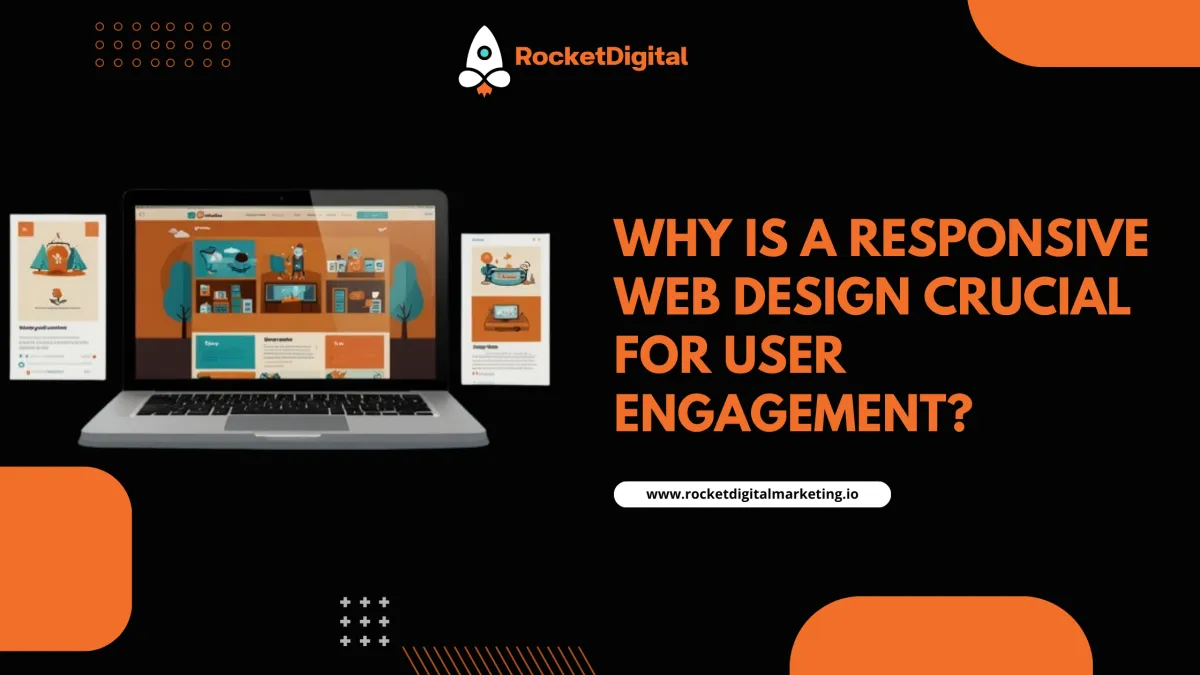
Why Is Responsive Web Design Crucial for User Engagement?
Responsive web design is crucial for engaging users on your website because it ensures they have a seamless experience, no matter the device they're using. You won't have to worry about them struggling with excessive pinching, zooming, or scrolling, which means they're more likely to stay engaged with your content. It also speeds up your site, cutting down on those pesky loading times that can drive visitors away. Plus, with Google favoring mobile-friendly sites, your SEO rankings get a boost, making it easier for new users to find you. And considering the massive amount of traffic coming from mobile users, you're essentially opening your doors to a broader audience. Stick around to uncover how this can transform your site's performance and user satisfaction.
Key Takeaways
- Responsive design ensures content is easily accessible on any device, enhancing user satisfaction.
- It eliminates the need for excessive zooming or scrolling, improving the browsing experience.
- Adapts content for faster loading times, reducing the chance of users leaving the site.
- Provides a consistent experience across devices, fostering user trust and engagement.
- Increases visibility in search engines, driving more traffic and potential engagement.

Enhances User Experience
In today's digital age, responsive web design significantly enhances user experience by ensuring websites adapt flawlessly across various devices. This approach is a cornerstone in mobile optimization, making sure that you don't have to pinch, zoom, or scroll excessively to view content on your smartphone or tablet. It's all about providing a consistent user experience, no matter if you're on a desktop in the office or using your phone in a coffee shop.
Responsive design boosts user engagement by removing the common barriers that frustrate mobile users. When websites adjust smoothly to any screen size, you're more likely to stay longer and engage more deeply with the content. This consistency ensures that the message or service offered by a site is accessible and enjoyable to everyone, regardless of how they access the internet.
Improves Site Speed
Responsive web design significantly enhances your site's speed, ensuring quicker loading times across various devices. By optimizing for responsiveness, your website adapts seamlessly, allowing elements to load efficiently whether your audience is on a smartphone, tablet, or desktop. This optimization is crucial for keeping your visitors engaged. In a digital age where every second counts, ensuring your site's speed is up to par means you're valuing your users' time and contributing positively to their overall experience. Faster loading times aren't just about user satisfaction; they're integral to user retention. Studies highlight how a mere one-second delay in site loading can lead to a 7% drop in conversions. This statistic underscores the direct relationship between site speed and the success of your digital platform. By prioritizing responsive design, you're directly combating bounce rates and fostering a welcoming environment for your audience to stay longer and interact more.
Moreover, a responsive design that improves site speed directly benefits your user experience. A fast-loading site removes barriers to content access, ensuring that your audience can get to what they need without frustration. This level of efficiency and consideration in design speaks volumes about your brand's commitment to user experience, setting you apart in a crowded digital landscape.

Boosts SEO Rankings
Adopting responsive web design boosts your SEO rankings, as Google places a premium on mobile-friendly sites. This isn't a mere trend but a pivotal element of search engine optimization (SEO) that you can't afford to overlook. When you embrace responsive web design, you're aligning your site with Google's preference, significantly enhancing your web presence. The design of your site becomes an asset, not just in aesthetics but in function, directly influencing how high you rank in search results.
Responsive web design is more than a technical fix; it's a strategic approach to SEO. By ensuring your site is adaptable across devices, you're effectively broadening your audience reach. This adaptability signals to search engines that your site is user-friendly, a critical factor in SEO rankings. It's about providing a seamless user experience, which search engines, especially Google, value highly.
Moreover, the incorporation of responsive design into your web strategy enhances your site's visibility. A mobile-responsive site is more likely to secure a higher position in search results, driving organic traffic. This isn't just about getting users to your site; it's about keeping them there. Responsive web design, therefore, isn't just beneficial; it's essential for your search engine optimization efforts.
Increases Mobile Traffic
Boosting your SEO rankings sets the stage for the next significant advantage of responsive web design: increasing mobile traffic. This aspect underscores the importance of responsive web design in today's digital landscape. By ensuring your website is mobile-friendly, you're not just ticking off a box for search engine optimization (SEO) criteria; you're also significantly enhancing user engagement.
Responsive web design plays a critical role in this process. It's no secret that mobile users dominate the internet landscape. If your site isn't optimized for their devices, you're missing out on a vast chunk of potential traffic. Through mobile optimization to connect with your audience, you're not just improving their browsing experience; you're also making it easier for them to interact with your content.
Studies have consistently shown that mobile optimization leads to an uptick in mobile traffic. This is because responsive web design adapts seamlessly to various screen sizes, making your site accessible and inviting to users on any device. Prioritizing responsive design is more than a strategic move for enhancing user engagement; it's a necessity in connecting with the ever-growing mobile audience.

Supports Multi-Device Users
In today's digital age, over half of all website traffic stems from mobile devices, underscoring the necessity for your site to support multi-device users seamlessly. Responsive design ensures that no matter the user's device—be it a desktop, laptop, tablet, or smartphone—your website adapts to provide an engaging experience. This adaptability is crucial not only for user satisfaction but also for capturing a wider audience.
Consider this: 57% of users won't recommend a business if its mobile site is lacking. That's a significant portion of potential advocates you're missing out on if your site isn't responsive. Moreover, with multi-device users spending over three hours daily on their mobile devices, it's clear that providing a consistent and engaging experience across all platforms isn't just nice to have—it's essential.
Besides the obvious user engagement benefits, responsive design brings SEO benefits. Search engines favor mobile-friendly websites, meaning your site's responsiveness directly impacts its search ranking. By catering to multi-device users with a responsive website, you're not just enhancing their experience; you're also boosting your SEO, making your site more visible to new users.
Frequently Asked Questions
Why Is Responsive Design Important for a Website?
Responsive design's crucial because it ensures your website looks great and works well on any device. It boosts user satisfaction, increases time on site, and improves your search rankings. Don't overlook its importance!
How Does Responsive Web Design Impact User Experience?
Responsive web design significantly impacts your user experience by adjusting the site to fit any screen size. This ensures you're always getting a seamless, easy-to-navigate website no matter the device you're using.
What Is the Obvious Advantage of Using Responsive Design?
The obvious advantage of using responsive design is that it makes your site accessible and appealing across all devices, boosting user satisfaction and engagement. It's a smart move to keep visitors happy and coming back.
Why Would You Recommend Using a Responsive Website for a Client?
You should recommend a responsive website because it'll adapt to any device, improving user experience and retention. It boosts engagement, increases mobile conversions, and enhances search rankings, offering your clients a competitive edge in their market.
Conclusion
In conclusion, you've seen why responsive web design is indispensable for engaging users effectively. It not only enhances your experience by making sites faster and easier to navigate on any device but also boosts a site's visibility on search engines, driving more traffic your way. Whether you're on a phone, tablet, or desktop, responsive design ensures a smooth, enjoyable journey across the web.
Unlock the full potential of your business with a custom, cutting-edge website designed by the experts at Rocket Digital Marketing. Don't let an outdated website hold you back. Click here to get started on your path to a compelling digital future!

